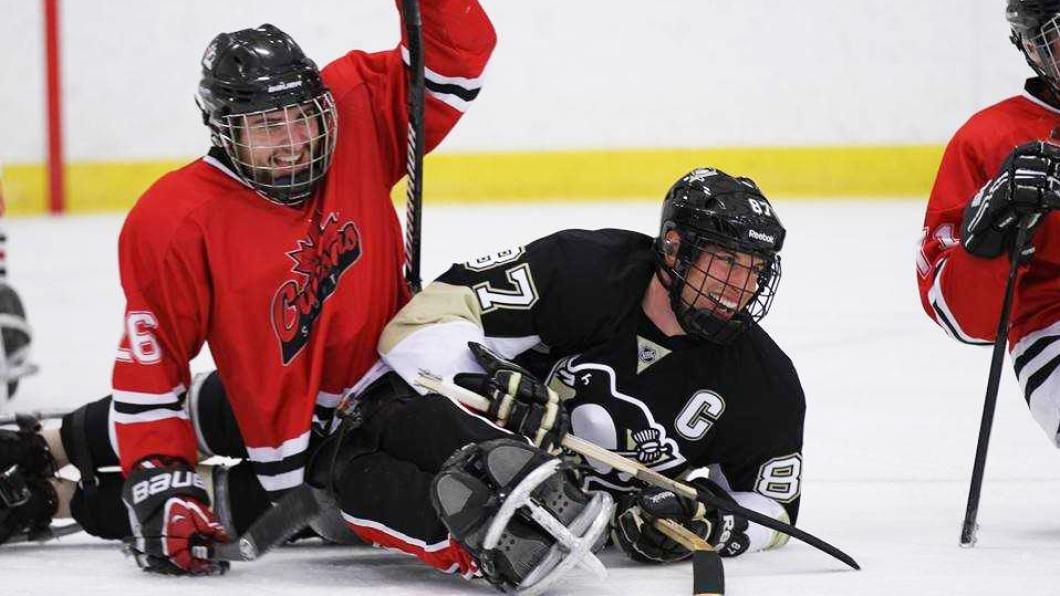
Talking to students 'helps me unpack the ableism I experienced as a child'
Image of Jordan Cullum (red jersey left) from his days competing in sledge hockey
By Louise Kinross
Jordan Cullum couldn't believe his good fortune when he landed a job at Holland Bloorview that takes him into schools to talk about disability and inclusion with students from kindergarten to university.
"To be honest, I came across this position totally by fluke, and it was just a perfect fit with everything I'd done in the past, whether it came to my education or volunteer work or lived experience with disability," Jordan says.
Jordan, who has spina bifida and walks with braces, studied Community and Justice Services and has volunteered with kids as a sports coach.
His outreach to schools is part of Holland Bloorview's Dear Everybody campaign—which began five years ago with an open letter from children with disabilities and their families that pushed readers to confront their own biases about disability and human value.
The hospital’s most recent campaign aimed to get people talking about ableism as a first step in dismantling it.
Ableism is a form of discrimination in which only some bodies, minds and behaviours are viewed as "normal" and valuable. It results in a bias against those with disabilities.
Jordan presents Dear Everybody school workshops with Nathan Gaba, and they use personal stories to illustrate why disability bias is harmful.
"The biggest challenge for me growing up was people thinking that I was less capable than people without disabilities," Jordan says. "Nobody overtly said anything, but when it came to physical things like gym or out at recess playing with friends, I always got the idea that people underestimated me and excluded me from things because they thought I was less able to do them. Unfortunately for me, in order to not really ruffle any feathers or create any confrontation, I never questioned that even though deep down I knew these attitudes were wrong and harmful."
Jordan says his workshops are an opportunity to talk about "traditional beliefs we've had about disability for decades, so we can shed them and make the world more inclusive and approachable and accessible."
That includes naming intentionally disparaging words to describe disability, but also more insidious ways of devaluing it. "There are things students may think are neutral or have a positive spin, when they really don't," he says.
"One of the phrases that I heard many times growing up was that people didn't see me as being disabled. I understand they were trying to say that in a positive way, but if you unpack it, it's almost like denying that I have a disability and invalidating my experience. Yes, my disability is real and I think it should be okay to accept that. But also understand that my disability is just one portion of my identity and doesn't dictate my entire life."
One of the challenges of Jordan's work is examining his own childhood experiences in a way he hasn't before. "It helps me unpack the ableism I experienced as a child that I wasn't even aware of, and to reflect on how it affected my overall development and ideas of self-worth. That can be difficult to navigate. I have to deal with a lot of negative, pent-up feelings that I never got the chance to express."
As a teen and young adult Jordan competed in sledge hockey at the national level. He recently went back to it as a way to help manage stress, he says. "This year I decided I'm going to go back and just play for fun."
Jordan says the greatest joy of his work is "seeing the reactions from some of the students, especially the younger kids who are more tuned into the world than we might think. I've had some e-mails from teachers or parents who say their students or children were really interested in the discussion and want to get involved. That gives me a lot of satisfaction and motivates me. We've also had really good conversations with high school and college students. Some of the topics are a bit uncomfortable or difficult to talk about, but we always say we're trying to educate and we're not here to judge."
Jordan says one of the common misconceptions young students have about disability is that "it's a bad thing or an inherently sad thing, and we want to educate people that there's nothing wrong or sad about disability, it's just another way of doing things. Younger kids often want to know whether animals have disabilities. It's interesting how their minds work."
With older age groups, "there's a common misconception that those of us with disabilities have to 'overcome' them in order to live a fulfilling life. We get them to think about what that says about our society and how it's structured. If having a disability is so difficult to live with that you can't do what other people can do, how can we change those structures to make sure everyone gets the proper support they need?"
Since Jordan came onboard last year, his school presentations have all been on Zoom. He's looking forward to when things open up so that he can do them onsite. "I'd love to get into the schools and be able to meet some of the students we're talking to and share our message in person."
Interested in booking a Dear Everybody Presentation for your school? Reach out to Jordan at jcullum@hollandbloorview.ca. Or learn more about the program. Like this story? Sign up for our monthly e-letter. You'll get family stories and expert advice on raising children with disabilities; interviews with activists, clinicians and researchers; and disability news: https://bit.ly/3IIK5Qo.